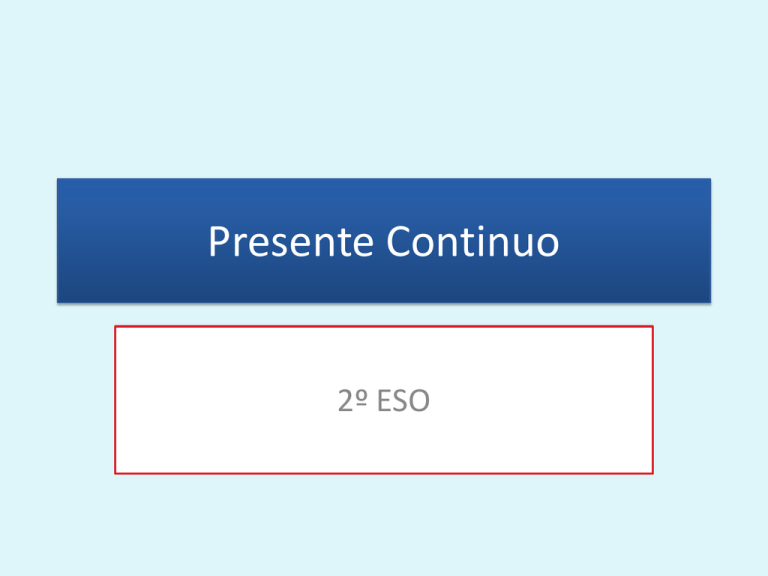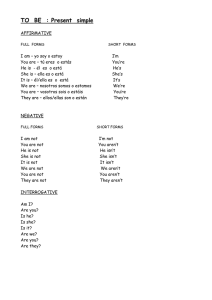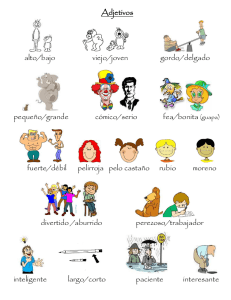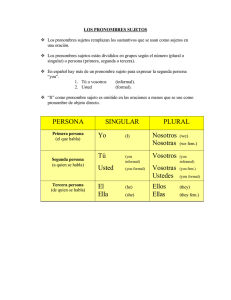Presente Continuo
Anuncio

Presente Continuo 2º ESO I am learning English Estoy aprendiendo inglés The Present Continuous Tense (tiempo presente continuo). Se usa con los verbos de acción y actividad (run, study, watch) ; se forma con el sujeto y el verbo TO BE en presente I'm, he's, you're, etc) y luego el verbo seguido de -ING (eating, drinking, etc.). Así se forman frases como: • l'm eating a sandwich • He's swimming in the pool Ejercicio 1 Completa estas frases con la forma correcta del presente continuo is reading 1. John ____________________________ (read) a book now. are you doing 2. What ________________________ (you/ do) tonight? are working 3. Jack and Peter _____________________ (work) late today. 4. Silvia _____________________ (not listen) to music. is not listening sitting 5. Maria is_______________________(sit) next to Paul. are you studying 6. How many other students ____________________ (you study) with? is not ringing 7. The phone _______________ (not ring). Ortografía de los gerundios 1. Los verbos cuyo infinitivo acabe en E (por ejemplo, prepare/ bake) pierden dicha e cuando se les añada la forma -ING: preparing prepare prepar make making take taking Ortografía de los gerundios 2. Los verbos de una sílaba que terminan en consonante simple precedida de una sola vocal (por ejemplo, sit y swim), doblan dicha consonante final cuando se les añade -ing: Sit sitting Swim swimming Ortografía de los gerundios NO se dobla la consonante si hay dos vocales w ait ead r waiting reading Ortografía de los gerundios Ni tampoco si el verbo acaba en -w -x o –y x fi fixing w blowing play playing blo Ortografía de los gerundios Recuerda que las normas no son las mismas que las de la +s study studies study studying NO se hace nada especial cuando el verbo acaba en -y. try trying say saying play playing Ejercicio 2 Escribe estos verbos en gerundio y ponlos en la columna donde correspondan. get –stop- swim- sit -watch -listen -drink -put – fly- enjoy -have -live - take - write - read – singvisit - win – feed – help - jump - wash + ing e ----> ing Cons+vocal+cons Ejercicio 2 Escribe estos verbos en gerundio y ponlos en la columna donde correspondan. Answers + ing e ----> ing watching having living listening writing taking drinking reading singing visiting flying enjoying feeding helping jumping vocal+ cons+cons getting swimming stopping sitting putting winning Ejercicio 3 Ordena estas frases en presente continuo 1. 2. 3. 4. 5. 6. with -Alex -watching -is -a –film- friends- his We -computer –games- playing- are is -the -Peter -car -washing is –her- hair- Mary -washing Peggy -drawing -a –picture- is his –sister- Henry- and- their- are- helping mother Ordena estas frases en presente continuo Answers 1. 2. 3. 4. 5. 6. Alex is watching a film with his friends We are playing computer games Peter is washing the car Mary is washing her hair Peggy is drawing a picture Henry and his sister are helping their mother Formas interrogativas del presente continuo Como en las frases en presente simple con el verbo to be, las preguntas se forman invirtiendo el sujeto y el verbo: • You are working • Are you working? • You are studying • What are you studying? Formas interrogativas del presente continuo OJO ! Esta norma es la misma cuando hay adverbios interrogativos Wh- + verbo to be + gerundio • Why are you waiting there? • What are you doing? Ejercicio 4 Escribe preguntas para estas frases 1. No, I am not studying 2. Because she is hungry 3. Ben is washing the dishes 4. The children are crying 5. Yes, they are having lunch Ejercicio 4 Escribe preguntas para estas frases. Answers 1. No, I am not studying Are you studying? 2. Because she is hungry Why is she eating? 3. Ben is washing the dishes What is Ben doing? 4. The children are crying Who is crying? 5. Yes, they are having lunch Are they having lunch? Respuestas cortas Recuerda el uso de las respuestas cortas: - Are you working? Yes, I am. NO Yes, I am working - Is he reading? Yes, he is. Are they dancing? Yes, they are Ejercicio 5 Escribe respuestas cortas sobre tí mismo/a 1. Are you eating now? 2. Are you studying English? 3. Are your parents working? 4. Is your teacher sleeping? 5. Is everybody in the class doing this exercise? La forma negativa del presente continuo Las frases negativas se forman poniendo NOT después del verbo TO BE. Ejemplo: They are not cooking She is not studying Ejercicio 6 Haz negativas estas frases 1. 2. 3. 4. 5. 6. The children are asking questions Nick is going to the gym I am opening the door The baby is crying Joe and Eva are eating hamburgers My teacher is waiting at the bus stop Ejercicio 6 Haz negativas estas frases. Answers 1. 2. 3. 4. 5. 6. The children are not asking questions Nick is not going to the gym I am not opening the door The baby is not crying Joe and Eva are not eating hamburgers My teacher is not waiting at the bus stop Recuerda que con frecuencia, estas formas negativas se abrevian • He isn't studying • We aren't eating Ejercicio 7 Escribe las formas verbales del ejercicio 6 abreviadas. Ejemplo: 1. aren’t asking Ejercicio 6 Formas abreviadas. Answers 1. 2. 3. 4. 5. 6. The children aren’t asking questions Nick isn’t going to the gym I’m not opening the door The baby isn’t crying Joe and Eva aren’t eating hamburgers My teacher isn’t waiting at the bus stop PRESENTE CONTINUO. USOS La forma del presente continuo puede ser usada para indicar acciones o aptitudes que están sucediendo ahora o en torno a este tiempo. (Con now, at the moment, these days) Ejemplos. The children are playing in the garden I am learning Chinese PRESENTE CONTINUO. USOS También sirve para hablar sobre el futuro cuando éste es inminente y siempre que no se confunda con una actividad que está sucediendo en el momento de hablar. (con next Tuesday, this evening, etc) • We are spending our holiday in Mexico this summer • They are having a Halloween party next Sunday Diferencia entre el presente simple y el presente contínuo Recuerda que empleamos el presente simple para hablar de cosas que normalmente son de una manera I study in Ciudad Real o hechos científicos permanentes It is cold in the winter Por el contrario , el presente continuo es para hablar de cosas no son normalmente así. I usually study French on Mondays, but today I am studying English He goes cycling every day, but today he is skating Ejercicio 7 Completa con los verbos entre paréntesis usando el presente simple o el presente continuo goes Sarah usually ……………… (go) swimming every Saturday is but this Saturday it ………………. (be) her birthday. She likes ……………. (like) chocolate cake so her sister is making (make) one for her now. Her mother …………………. is cooking (cook) food at the moment and her father ………………. is doing …………………. (do) the shopping. Sarah wants ……………… (want) everything to be nice for her party. Now she and her brother are ……………… making…….(make) hats for the children. have They always ……………….. (have) a good time at parties. sing dance They usually ………………. (sing) and ………………… (dance) play (play) their favourite games. a lot and ………… Ejercicio 8 Completa con los verbos entre paréntesis en presente simple o presente continuo doesn’t work (not / work) on Saturdays. Lucy ………………………… Don’t move! I ………………………… (take) a photo of you! am taking ………………………… (you / like) classical music? Do you like are you waiting (you / wait) for me? Hello! ………………………… are learning We ………………………… (learn) about the Romans in our history class. phones 6 My mum often ………………………… (phone) her friends in the evening. is Richard doing (Richard / do)?’ 7 ‘What ………………………… ‘He’s a writer.’ don’t need 8 We ………………………… (not / need) any rice or potatoes. 1 2 3 4 5 Ejercicio 9 Completa con los verbos entre paréntesis en presente simple o presente continuo do you believe 9 Who ………………………… (you / believe)? Elena or me? is working 10 Rory isn’t here. He ………………………… (work). do you know 11 ………….you………(know) the answer to this question? do not taste (not taste) very 12 yuk! These bananas ………………. nice. Is looking 13 …………. Silvia ……………(look for) me? No, I don’t think so. am not listening 14.- I …………………..........(not listen) to the radio. You can switch it off. 15.- hurry up! Carlos is…………………..(wait) for you! waiting Ejercicio 10. Traduce. 1. Elena está estudiando inglés Elena is studying English 2. ¿Estás oyendo música? No, estoy escuchando la radio Are you listening to music? No, I am listening to the radio 3. Siempre está trabajando She is always working 4. ¿Qué están haciendo? Están preparando la cena What are they doing? They are making dinner 5.¿Vas a ir a Madrid este fin de semana? No, me voy a quedar en casa Are you going to Madrid this weekend? No, I am staying at home


